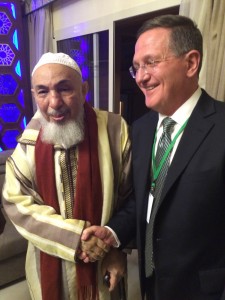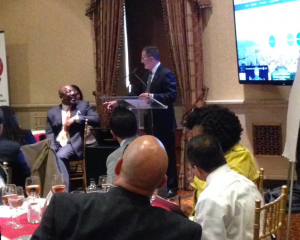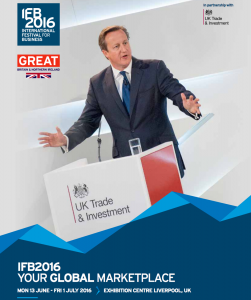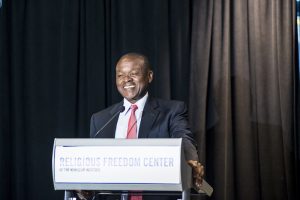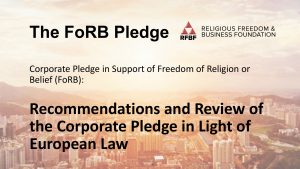 by Ryan Anderson, Juris Doctor Candidate, 2017 University of Oklahoma College of Law
by Ryan Anderson, Juris Doctor Candidate, 2017 University of Oklahoma College of Law
As part of collaborative research between the Religious Freedom & Business Foundation and University of Oklahoma College of Law, Ryan Anderson looked at the legal protections for religious non-discrimination in the workplace in Europe.
Anderson did this research as part of a class taught by Professor of Law at the University of Oklahoma, Evelyn Aswad, who received OU’s 2016 David L. Boren Award for Outstanding Global Engagement in recognition of her commitment to and support for Oklahoma University’s international mission.
QUESTIONS
Does international law and domestic law in four European countries fall short of the standards set forth in the Religious Freedom and Business Foundation Corporate Pledge? If so, what changes to the Pledge or your Foundation’s website could be made to fill this gap?
BRIEF ANSWERS
Freedom of religion laws in the Netherlands, Germany, Spain, and Belgium, do not meet the standards provided in the Religious Freedom and Business Foundation Corporate Pledge (“the Pledge”). Similarly, international law also falls short of the standards set forth in the Pledge. There are several reasons why there is a gap between the Pledge and international, or local domestic law in these countries. Therefore, companies signed to the Pledge will likely violate the provisions of the Pledge.
First, some countries have under-inclusive interpretations of “religion or belief.” This leads to inconsistent protection across borders, and is discussed in Section III. Second, there are no “explicit” requirements in international or the relevant domestic laws that require employers to make reasonable accommodations for religious purposes. This is discussed in Section IV. Section V discusses how neutral company policies are treated differently within domestic and international law. This has led to a dramatic increase in the frequency of cases involving “neutral” policies that are intended to promote the “company’s image,” but result in a disproportionately negative effect on some people. Adopting the Human Rights Committee interpretation of “religion” and “belief” set forth in General Comment No. 22, will provide clear guidance to companies, and allow those companies to provide their employees with consistent protection throughout the world. Annex A, immediately following this memorandum, includes a brief summary of the general workplace religious freedom laws in each of these countries.
PDF of Full Study: Recommendations and Review of the Corporate Pledge in Light of European Law
I. ISSUE PRESENTED
How does international law and domestic law in four European countries fall short of the standards set forth in the Religious Freedom and Business Foundation Corporate Pledge? What changes could be made to fill this gap?
II. SHORT ANSWER
Freedom of religion laws in the Netherlands, Germany, Spain, and Belgium, do not meet the standards provided in the Religious Freedom and Business Foundation Corporate Pledge (“the Pledge”).[1] Similarly, international law also falls short of the standards set forth in the Pledge. Therefore, by following international, or local domestic law in these countries, companies signed to the Pledge will likely violate the provisions of the Pledge. First, some countries have under-inclusive interpretations of “religion or belief.” This leads to inconsistent protection across borders, and is discussed in Section III. Second, there are no international or domestic laws that require employers to make reasonable accommodations for religious purposes. This is discussed in Section IV. Section V discussed how neutral company policies are treated differently within domestic and international law. This has lead to a dramatic increase in the frequency of cases involving “neutral” policies that are intended to promote the “company’s image,” but result in a disproportionately negative effect on some people. Annex A, immediately following this memorandum, includes a brief summary of the general workplace religious freedom laws in each of these countries.
III. Defining Religion or Belief: Reason for the Change
There is not a consistent definition or interpretation of religion or belief throughout international documents, or among these four countries. Adopting a clearer interpretation of “religion” or “belief” would provide a guideline for companies to follow. One reason that international documents have avoided providing a formal interpretation of religion or belief is to “avoid the danger of courts being bound by an outdated or under-inclusive definition.”[2] This would likely cause minority or new religions to fall outside the protections provided in the document. The downside of not having a formal definition is that there is inconsistent protection, across borders, for members of the same religion.
The Human Rights Committee (“the Committee”) oversees implementation of the International Covenant on Civil and Political Rights (“ICCPR”), and provides general comments on the articles within the ICCPR. In issuing General Comment No. 22, the Committee provided its interpretation for “religion” and “belief.” The Committee avoids a definitive statement about what constitutes religion, in favor of broader terminology, which includes “theistic, non-theistic, and atheistic beliefs.”[3] If companies signed to the Pledge follow the domestic interpretation, they could provide inconsistent protection for members of the same religion, depending on where the company was operating. Therefore, adopting the interpretation set forth in General Comment No. 22 would provide clear guidance to companies, and allow them to provide their employees with consistent protection throughout the world.
Part A of this sub-section explains how the European Court of Human Rights (“ECtHR”) and the European Union Employment Equality Directives have interpreted “religion” and “belief.” Part B examines the definitions of “religion” and “belief” provided by the International Labor Organization, and the ICCPR. Part C provides a brief overview of the domestic legislation in each of these four countries, and how their domestic courts have interpreted “religion” and “belief.” Part D provides a conclusion, and part E includes recommendations for defining “religion” and “belief” for purposes of the Corporate Pledge.
European Interpretation of Religion and Belief
The Employment Equality Directive[4] (“the Directive”), introduced by the European Commission in 2000, established a general framework for equal treatment in employment and occupation throughout EU member states.[5] Like other international documents dealing with rights based on religion and belief, there is no definition provided in the Directive itself.[6] The lack of a formal definition allows for adaptation, which in turn, provides protection to minority or new religions.[7] However, this comes with a disadvantage, because it allows for inconsistent treatment throughout Member States.[8]
The ECtHR jurisprudence proves helpful for courts seeking guidance on the scope of these terms. Article 9 of the European Convention on Human Rights concerns freedom of religion in general, but the provision is much broader than merely religion.[9] It applies to all personal, political, philosophical” and “religious convictions.”[10] Article 9 “extends to . . . philosophical convictions of all kinds, with the express mention of a person’s religious beliefs, and their own way of apprehending their personal and social life.”[11] For example, pacifism falls within the purview of Article 9 because the “attitude of a pacifist can be regarded as a ‘belief.’”[12] However, for personal convictions to be protected, the convictions must be “more than mere opinions.”[13] “It must be possible to identify the formal content of the convictions.”[14]
In Eweida and Others v. United Kingdom, the Court’s decision opened the possibility of protecting individualistic manifestations of religion by stating, “there is no requirement on the applicant to establish that he or she acted in fulfillment of a duty mandated by the religion in question.”[15] In Eweida, the ECtHR explained that to be considered a “‘manifestation’ within the meaning of Article 9, the act in question must be intimately linked to the religion or belief.”[16]
The ECtHR has interpreted “belief” through its jurisprudence. It does not require beliefs to be religious in nature to be protected, but there are still limits on what beliefs are protected.[17] The ECtHR has not drawn a firm dividing line between beliefs that are protected, and those that are not.[18] The term ‘belief’ would likely include religious beliefs, so it is highly likely that by including ‘religion,’ the European Commission intended to place parameters on ‘belief.’[19] The ECtHR jurisprudence reflects this limitation by requiring a belief, in order to be protected, must “attain a certain level of cogency, seriousness, cohesion, and importance.”[20] The protection of the ECtHR has been extended in some cases to beliefs such as pacifism[21] and veganism.[22] The Directive clearly includes atheism and other non-religious viewpoints.[23]
International Interpretations of Religion and Belief
The International Labour Organization (“ILO”) Convention No. 111 prohibits discrimination on the basis of religion, but does not provide a formal definition.[24] The ILO defines religious discrimination as “includ[ing] distinctions made on the basis of expression of religious beliefs or membership in a religious group.”[25] This also includes discrimination against people who do not “ascribe to a particular religious belief or are atheists.”[26]
Article 18 of the International Covenant on Civil and Political Rights (“ICCPR”) prohibits discrimination on the basis of thought, conscience, and religion.[27] The Human Rights Committee (“the Committee”) is the UN authorized body that provides interpretations of the ICCPR’s provisions, and overseas implementation of the ICCPR.[28] The Committee avoided providing a clear definition of what constitutes religion or belief, in favor of broader terminology.[29] Through General Comment No. 22, the Committee pointed out that article 18 is “far-reaching” as it “encompasses freedom of thoughts on all matters, personal conviction and the commitment to religion or belief, whether manifested individually or in community with others.”[30] The general comment states, “[t]he terms belief and religion are to be broadly construed,” and “article 18 protects theistic, non-theistic and atheistic beliefs, as well as the right not to profess any religion or belief.”[31] General Comment No. 22 further clarifies that “article 18 is not limited in its application to traditional religions or to religions and beliefs with institutional characteristics or to practices analogous to those of traditional religions.”[32]
Domestic Interpretations of Religion and Belief[33]
This subsection discusses the different interpretations of “religion” and “belief” in the United States, the Netherlands, Germany, Spain, and Belgium.
In the United States, ‘religion’ has been defined, for Title VII purposes, as “includ[ing] all aspects of religious observances and practice, as well as belief.”[34] This is a very inclusive interpretation, and the focus of this approach is on the individual’s “ultimate concern.”[35] The focus on ultimate concern is based on the belief that everyone has concerns which are ultimate, meaning the concerns are “absolute, unconditional, and unqualified,” while providing “meaning and orientation to our lives.”[36] This approach is subjective and flexible. It can provide protection for minority or new religions, and belief systems that would not otherwise meet the objective standards of the majority world religions.[37] This approach also provides protection for non-belief or atheistic beliefs.[38] The broad inclusiveness of this approach raises a major issue. For example, it does not provide the framework to distinguish between an individual’s ‘ultimate concern’ with his favorite sports team, and an ‘ultimate concern’ with the tenets of Islam.[39] Overall, the United States’ approach of broad inclusiveness allows protection for minority and new religions, and allows employers and courts to operate within a framework of commonsense when determining whether a belief system is of ‘ultimate concern.’
The Netherlands distinguishes between religion and belief in its case law. The central requirement for a religion in the Netherlands is a “high authority” (i.e. God).[40] With this, the Equal Treatment Commission (“ETC”) has found Rastafarianism to be a religion.[41] In contradiction, the ETC found that “’Osho,’ the Bagwan Shree Rajnees philosophy” was not a religion, but instead a “belief” or “philosophy of life.”[42] The term “philosophy of life” is used in place of “belief,” as a way of placing limitations on the types of belief that can be covered.[43] The approach taken by the Netherlands creates a more restrictive definition of religion and belief, and will likely hinder minority or new religions. It appears that the Netherlands uses the term “philosophy of life” when it wants to place limitations on which belief systems are to be protected. However, when the court wants to recognize a belief system, it will use the term “belief” in conjunction with the term “religious.” The Netherlands provides protection for atheism and other non-belief systems.[44]
In Germany, a definition of religion and belief can be found in the interpretation of the guarantee of freedom of religion by the Federal German Constitutional Court (“FGCC”). There is no definition provided at the Constitutional level.[45] Rather, through the FGCC’s rulings, the interpretation of religion and belief has become more or less uncontested.[46] According to the FGCC, “religion and belief are characterised [sic] by a sense of certainty with regard to assertions concerning heaven and earth, as well as to the origin and purpose of human life.”[47] Religion is based on a “reality that extends beyond and transcends the sphere of human perception” while “[b]elief is limited to relationships within the material world.”[48] The difference is important, because the AGG prohibits discrimination based on belief only with regard to labor law, while religion is protected within labor and civil law.[49]
The FGCC definition is similar to the United States approach in that it appears to be based on the idea of “ultimate concern.”[50] However, it also has some reasoning based on current trends in society, religious science, cultural tradition, and the understanding of religion in general.[51] For example, the FGCC accepted Bahá´í as a religion through reliance on current trends in society and cultural traditions.[52] Germany’s broad definition extends protection to atheism, as well as other non-belief systems.
In Spain, neither national law, nor the Worker’ Statute provide a definition for religion or belief.[53] However, Spain provides a negative definition of religion, meaning that instead of defining religion, it defines what is not religion. Article 3.2 of the Organic Law on Religious Freedom states that “activities, intentions and entities relating to or engaging in the study of and experimentation on psychic or parapsychological phenomena or the dissemination of humanistic or spiritual values or other similar non-religious aims do not qualify for the protection provided in this Act.[sic]”[54] Protection of atheistic, and non-belief systems appears to be inherent within the negative definition of religion.
Belgium is similar to Spain in that it defines “sects,” and protection is denied to members of these groups.[55] Belgium defines “sects” as being “any group with a religious or philosophical vocation . . . which in its organization or practice, performs illegal and damaging activities, causes nuisance to individuals or to the community or violates human dignity.”[56] This approach appears to deny the status of “religion” to those “religions” or “beliefs” that do not respect the rights of others, and accordingly, they may be denied protection against discrimination. The consequence of this approach is that it is subjective, and can lead to inconsistent application. For example, if Belgium instituted prohibition, any religion that requires a sip of wine for communion would become a “sect.” The members of that religion would no longer enjoy the protection provided to others.
Conclusion
The lack of a clear definition across EU Member States has both positive and negative consequences. Because the term “religion” remains undefined, it is able to reflect modern developments and cultural trends in society. The negative aspect is that each Member State is able to provide different protections, or none at all, to members of the same religion. The Member States would benefit greatly from a clearer definition provided by the ECtHR. However, once that definition is enforced, the Member States will have a difficult time adapting to a rapidly changing society.
My Recommendation for Defining Religion or Belief
I suggest adopting the Human Rights Committee’s interpretation in General Comment No. 22. This would provide helpful guidance to determine whether an employee is a member of a recognized religion or belief system. General Comment No. 22 provides the most inclusive framework. This will help companies with real-time decision making that will likely have a significant impact on both the company and the individual employee. I recommend providing the following language on the Religious Freedom and Business Foundation website:
For purposes of the Corporate Pledge, Religion and Belief are to be interpreted according to ICCPR General Comment No. 22, which includes “all theistic, non-theistic and atheistic beliefs, as well as the right not to profess any religion or belief,” and is not limited to “traditional religions or to religions and beliefs with institutional characteristics or practices analogous to those of traditional religions.” (For further information on General Comment No. 22 or the ICCPR visit www.treaties.un.org).
When Reasonable Accommodations Should Be Made: Reason for the Change
Legislators and courts have been reluctant to implement a legal requirement on employers to make reasonable accommodations for employees based on religious reasons.[57] Furthermore, the four countries included in this research do not have legislation requiring employers to make “reasonable accommodations.” Some countries do have laws that place a specific duty to accommodate periods of work and rest, but these laws do not go as far as reasonable accommodations.[58] Therefore, if a company signed to the pledge follows local domestic law, they will likely violate the reasonable accommodation provision within the Corporate Pledge. Part A of the section includes a brief discussion of the United States approach to “reasonable accommodations,” and part B explains why corporations should be willing to make reasonable accommodations based on religious purposes.
The United States Approach to Reasonable Accommodations[59]
The United States introduced reasonable accommodations in 1972.[60] “[A] duty to ‘reasonably accommodate’ employees’ religious beliefs, observance and practices was introduced under Title VII of the Civil Rights Act.”[61] Employers are not required to make reasonable accommodations based on religious reasons if it would cause “undue hardship.”[62] The Supreme Court adopted a “de minimis” standard for assessing whether there is an undue hardship on the company’s pursuit of its business.[63] This standard requires employer’s to reasonably accommodate an employee’s religious beliefs or practices unless the accommodations would cause more than a “minimal burden” on the company’s business operations.[64] Examples of common religious accommodations include flexible scheduling, allowing employees to voluntarily swap or substitute shifts, job reassignments, and modifications to workplace policies or practices.[65] An employer may also be required to make accommodations that result in infrequent payment of overtime to employees who substitute shifts.[66] Accommodations that are costly, compromise workplace safety, decrease efficiency, infringe on the rights of other employees, or require other employees to handle “more than their fair share of potentially hazardous or burdensome work,” generally constitute an “undue burden.”[67]
Why Corporations Should Provide Reasonable Accommodations Based on Religious Purposes
There are two main reasons corporations should be willing to make reasonable accommodations for employees based on religious purposes. First, making reasonable accommodations is not a zero-sum game, and companies should not wait for the law to require reasonable accommodations. Second, making reasonable accommodations can affect a company’s bottom line by reducing turnover. This mitigates much of the risk associated with new employees in the workplace, as well as the cost of training a new employee.
Making Reasonable Accommodations is Not a Zero-Sum Game
Many corporations appear to treat reasonable accommodations as a zero-sum game. Simply rephrasing questions about reasonable accommodations can lead to a different thought process.[68] Asking “what is a fair distribution of the burdens between the employer and employee?” instead of “when is the cost too high for employers?”, provides an alternative way of thinking.[69] It encourages openness and dialogue between the employer and employees, and it creates a team environment that allows for creative problem-solving. Allowing employees of minority religions to voice their concerns will lead to creative solutions without the obligations imposed by legislation. Companies should not wait for the law to tell them what accommodations are legally required. Companies are incentivized to act on this before the law requires it, because they remain in control of determining when and how to accommodate. If companies can solve these problems, the call to implement legal requirements may subside.
Making Reasonable Accommodations Affects the Company’s Bottom Line
Many organizations place a high value on the safety and health of their employees out of good will, but these companies also have financial incentives. This is evidenced by company safety policies, which often dedicate a significant amount of time to training new employees. A recent study conducted by the Institute for Work & Health, Toronto found that new workers faced a higher injury rate in the workplace over the past ten years, while overall lost-time claim rates declined.[70] The study found that workplace risk is “particularly elevated” for employees during their first month on the job.[71] New workers create a greater risk of injury due to many factors including inexperience and inadequate training.[72]
One way to mitigate this risk is to develop policies and practices that reduce job turnover and raise morale.[73] Making reasonable accommodations for religious purposes will likely reduce turnover. Research has shown that even “perceived” workplace discrimination can lead to harmful work outcomes for targeted individuals.[74] These negative outcomes include “intentions to quit, job withdrawal . . . less effective work relationships . . . and increased likelihood of changing jobs.”[75] These outcomes focus on the individual, but other research has identified the negative outcomes for the organization.
When employees believe their employer’s policies might be discriminatory, their commitment to the organization is negatively affected, which often leads to the employee’s departure, or intent to leave.[76] The cost of replacing an employee “can range from 50-200% of the individual’s annual salary, and are independent of litigation and efforts to repair or maintain the company’s reputation if charges of discrimination are levied.”[77] These costs include acquiring and training a new employee, lost productivity, and loss of productivity by co-workers and employees tasked with training the new employee.[78]
Mitigating job turnover should be a concern for all companies. It is clear that it imposes many harmful consequences to the individual employee, as well as the organization as a whole. Actively managing diversity in the workplace can be an asset to an organization, and making reasonable accommodations for religious purposes can help foster a diverse workplace that is free from discrimination.
Conclusion
Although there is no legal obligation to provide reasonable accommodations based on religious reasons, there is ample evidence that doing so will result in a more productive, and more diverse workplace. Making reasonable accommodations raises morale and mitigates job turnover. This will lead to direct, and indirect savings for the organization.
Neutral Company Policies Must Not Allow Indirect Discrimination
Often times, indirect discrimination is concealed behind seemingly “neutral” company policies and rules that, on the surface, apply to everyone, but have a disproportionately negative effect on members of non-majority religions.[79] The effect of this can be seen in management of holidays in the workplace. Members of dominant religions generally do not have issues combining work obligations with the celebration of religious holidays, while members of minority religions often experience complications.[80] There has been an increase in the number of cases in which indirect discrimination results from neutral policies regarding corporate dress code regulations that promote a company’s corporate image.[81] Outside of litigation, resolution requires a culture of open communication within an organization throughout all levels of employment, and a willingness to make reasonable accommodations or specific exceptions for certain individuals, as discussed above.[82]
Neutral company policies that result in indirect discrimination are prohibited by European law, and are only justified if the policy is in pursuit of a legitimate aim, and the means of achieving that aim are necessary and proportionate.[83] In the United States, neutral company policies are not given a presumption of validity if they result in indirect discrimination (disparate impact).[84] The approach in Belgium is quite different. If the company had a neutral policy in place, and the employee knew of the policy and agreed to work under the terms of the policy, even if the policy disadvantaged the individual employee, it is still likely to be found proportionate and reasonably justified.[85]
These neutral policies allow companies to voice their “conscience,” and some ‘for-profit’ companies are “claiming the benefit of exemptions based on religious freedom.”[86] Other companies seek to require or respect neutrality in their brand, which is the subject matter of the Belgian cases discussed in footnote “85” above.[87] In these cases, the “convictions of the employer might overcome the rights of the employees.”[88] Cases involving seemingly “neutral” company policies are likely going to increase. If companies take proactive measures to avoid indirect discrimination through the use of “neutral” policies, these claims will likely subside.
CONCLUSION
It is undeniable that there has been an increase in the frequency of cases regarding religious freedom in the workplace. With the current situation throughout much of Europe, it is likely that these cases will continue to increase in frequency. It is important for companies to create a policy of non-discrimination that extends to religion. The Pledge is a great way for companies to be champions of religious freedom in the workplace, and to promote religious freedom in the communities in which they operate.
ANNEX 1
SUMMARY OF RELEVANT FREEDOM OF RELIGION OR BELIEF LAWS[89]
There is no controlling law that explicitly sets forth an international standard for prohibiting workplace discrimination based on religion. From Title VII of the Civil Rights Act of 1964 in the United States, to the Workers’ Statute in Spain, domestic legislation has attempted to solve discrimination in the workplace based on race, gender, ethnicity, religion, political beliefs, and more. This has led to members of the same religion being protected by law in some countries, but not others, as well as some minority religions not being protected by domestic or international law at all. This annex provides a brief overview of the relevant workplace freedom of religion laws in the ECHR, ICCPR, the United States, the Netherlands, Germany, Spain, and Belgium.
- Overview of United States Freedom of Religion or Belief Law[90]
The United States protects freedom of religion in the workplace through Title VII of the Civil Rights Act of 1964.[91] Title VII, as amended, prohibits two categories of employment practices. First, “to fail or refuse to hire or to discharge any individual . . . because of such individual’s . . . religion[.]”[92] Second, employers are prohibited from “limit[ing], segregate[ing], or classify[ing] . . . employees or applicants . . . in any way which would deprive or tend to deprive any individual of employment opportunities or otherwise adversely affect his status as an employee, because of such individual’s . . . religion.”[93]
Unlawful discrimination claims are categorized based on whether they include disparate treatment (intentional discrimination), or disparate impact (indirect discrimination).[94] Title VII prohibits employers from making an employee’s religious practice, confirmed or otherwise, a motivating factor in employment decisions.[95] Title VII extends this protection to job applicants, as well as current employees.[96] A violation of Title VII will be found where an employer makes religious practice a motivating factor in any employment decision, including the employment or termination of an employee.[97]
- European Convention on Human Rights Freedom of Religion or Belief Law
Due to developments in the legal framework available to claimants, and also because of the growing religious diversity and assertiveness among religious minorities in Europe, the European Court of Human Rights (“ECHR”) has experienced an undeniable increase in legal cases involving religious issues.[98] However, these legal cases represent only a few instances of workplace discrimination. Most employees deal with discrimination without consulting a lawyer and initiating litigation, which explains the lack of case law in many countries.[99] European Union (“EU”) states have widely divergent approaches to tolerance, acceptance, or requirements regarding reasonable accommodations for religious dress, holidays, or other practices of religiously observant employees.[100] Some states require employers to provide employees with time off for religious holidays, or to make some accommodations based on religion, but this is clearly not the case in the majority of Member States.[101] For example, various respondents in the Netherlands have argued for a level of flexibility when it comes to religious employees in the workplace.[102] In contrast, French employers strongly rejected any deviation from strict equal treatment of all employees.[103]
The legal framework of the ECHR can be split into two categories of cases: hard cases and soft cases. Soft cases do not involve a conflict between fundamental rights provided within the European Convention on Human Rights (“the Convention”).[104] Safety and security of employees, customers, or patients generally falls within the soft case framework.[105] Hard cases occur where tension or conflict between fundamental rights of the Convention can be detected.[106]
Hard cases require the court to conduct an Article 9 balancing test to determine whether the limitation placed on the employee’s right to manifest his religion is justified. The tripartite test requires the limitation to be 1) prescribed by law; 2) necessary in a democratic society; and 3) in the interests of public safety, public order, health or morals, or for the protection of the rights of others.[107] Regarding freedom of religion cases in the workplace, the ECtHR has consistently used the provision, “for the protection of the rights of others”, as a basis to limit an individual’s right to manifest his or her religion.[108] In such cases, the court should conduct a fair balance “between the competing interests of the individual and of the community as a whole.”[109] However, the balancing test is subject to the “wide margin of appreciation enjoyed by the State.”[110] The Eweida decision requires sufficient consideration of the employee’s fundamental right to freedom of religion, before deferring to the decision made by national courts. However, individuals will not always win their case due to the fact that other’s interests are implicated, and may justifiably prevail.[111] The ECHR has made it clear that business image interests will not automatically prevail, and employee interests may only be acknowledged nominally.[112]
Prior to the Eweida case, the ECHR followed the “freedom to resign doctrine.”[113] This doctrine prohibited the Court from finding a violation of Article 9 in situations where the employee was free to resign his or her employment.[114] The Eweida decision explicitly rejected the “freedom to resign doctrine,” and now the possibility for an employee to find alternative employment no longer bars the finding of an interference with a right provided by the Convention.[115] Under Eweida, alternate employment is merely one factor in the justification and proportionality assessment of the tripartite test.[116] This allows the ECHR to more readily find an interference with a right, and continue by examining whether a fair balance was made between the competing interests at stake.
In Eweida, the ECtHR opened the possibility for individualistic manifestations of religion by stating, “there is no requirement on the applicant to establish that he or she acted in fulfillment of a duty mandated by the religion in question.”[117] The Court held that “[i]n order to count as a ‘manifestation’ within the meaning of Article 9, the act in question must be intimately linked to the religion or belief.”[118] Manifestation of religion is a factual issue that must be decided on a case-by-case basis.[119] It has yet to be seen how the ECHR will handle the individualistic manifestations post-Eweida, but it appears that it will have a dramatic effect on the Member States’ domestic courts in the context of neutral company policies, discussed below.
Overview of the International Covenant on Civil and Political Rights Freedom of Religion or Belief Law
Article 18 of The International Covenant on Civil and Political Rights (“ICCPR”) provides that “[e]veryone shall have the right to freedom of thought, conscience and religion” and this right includes the “freedom . . . to manifest his [or her] religion.”[120] Article 18(3) states that an individual’s right to manifest his or her religion or beliefs “may be subject only to such limitations as are prescribed by law and are necessary to protect public safety, order, health, or morals or the fundamental rights and freedoms of others.”[121]
Overview of the Netherland’s Freedom of Religion or Belief Law
Article 1 of the Dutch Constitution prohibits discrimination based on “religion, philosophy or life, [or] political convictions.”[122] It can be invoked by the government, private institutions, and even between individuals.[123] The Act of Working Conditions, known as “Arbeidsomstandighedenwet,” places a positive obligation upon employers to “prevent and combat discrimination.”[124] The General Equal Treatment Act (“GETA”) is the civil law requiring equal treatment.[125] It covers, among other areas, “religion [and] belief.”[126] The Dutch legislation goes beyond the protections required by the EU directives,[127] by providing protection against discrimination based “on the grounds of religion and belief. . . in the area of goods and services.”[128] Overall, the language within the GETA is in line with the Directives, and where differences exist, the GETA has been interpreted in line with the Directives.[129]
Overview of Germany’s Freedom of Religion or Belief Law
The Constitution, or “Basic Law” (Grundgesetz), is of central importance for understanding the German legal framework on discrimination.[130] Fundamental rights are part of this directly effective constitutional order.[131] In August, 2006, Germany enacted an anti-discrimination law, which implements four European Directives[132] in German law, including the General Act on Equal Treatment (Allgemeines Gleichbehandlungsgesetz (“AGG”).[133] The AGG protects people who are discriminated against based on religion or belief.[134] Similar to the Netherlands legislation, the AGG surpasses the requirements of the EU Directives, by applying the protections to goods and services, as well as in employment.[135]
Overview of Spain’s Freedom of Religion or Belief Law[136]
Article 4.2.c of the Workers’ Statute (modified by Law 62/2003, Article 37) (“the Workers’ Statute”) protects individuals from direct or indirect discrimination in employment . . . on the grounds of . . . religio[n] or belief.”[137] Article 314 of the Spanish Criminal Code “provides that an offence is committed against workers’ rights by ‘whosoever causes serious discrimination in public or private employment,’” but the Criminal Code fails to define “serious discrimination.”[138] However, this shows that the prohibition on discrimination extends to private employment. Article 16.2 of the Workers’ Statute guarantees equal treatment and non-discrimination within non-profit employment agencies.[139]
All labor regulations affect labor relations in both the private and public sectors.[140] Spain, like most countries, has exceptions for organizations with religious-based ethos. For organizations with a specific ethos, “Article 6 of the Organic Law on religious freedom states that ‘[r]egistered churches, faiths, and religious communities shall be fully independent, and may lay down their own organisational [sic] rules, internal and staff by-laws.’”[141]
Overview of Belgium’s Freedom of Religion Law
Articles 10 and 11 of the Constitution prohibit discrimination, but they are rarely applied to private relationships due to the “general formulation, and the delicate issues which would be entailed by their application in this context.”[142] For example, “to protect an individual from private acts of discrimination by an employer.”[143] The major anti-discrimination legislation affecting employment is the General Anti-Discrimination Federal Act (“General Anti-Discrimination Act”), which protects discrimination for many reasons, including “religious or philosophical belief.”[144]
[1] The research contained within this memorandum came from public sources.
[2] Lucy Vickers, Religion and Belief Discrimination in Employment – the EU law, 28. (2006).
[3] UN Human Rights Committee, General Comment No. 22 (48) on Article 18 of the International Covenant on Civil and Political Rights, para. 2, reported in (1994).
[4] Council Directive 2000/78/EC
[5] Vickers, supra, at 4.
[6] Id.
[7] Id.
[8] Id. (i.e. “Scientology is recognized [sic] in some Member States, but not in others.”).
[9] Council of Europe, European Court of Human Rights Research Division, Overview of the Court’s Case-Law on Freedom of Religion, para. 9 (19 Jan. 2011, updated 31 Oct. 2013).
[10] Id.
[11] Id.
[12] Id.
[13] Id. at para. 10.
[14] Id.
[15] Eweida and Others v. United Kingdom, 2013 Eur. Ct. H.R., at para. 82.
[16] Id.
[17] Lucy Vickers, Religion and Belief Discrimination in Employment – the EU law, at 29. (2006).
[18] Id.
[19] Vickers, supra, at 29.
[20] Id. at 4.
[21] Arrowsmith v. UK (1978) 19 D.&R. 5., at 126, para. 1.
[22] Vickers, supra, at 29; see H v. UK (1993) 16 EHRR CD 44.
[23] Vickers, supra, at 30.
[24] International Labour Organization Convention, 1958 (No. 111), art. 1(a).
[25] International Labour Organization Help Desk.
[26] Id.
[27] International Covenant on Civil and Political Rights, art. 18(1).
[28] United Nations Human Rights Office of the High Commissioner.
[29] See Human Rights Committee, General Comment No. 22 (A/48/40, vol. 1, annex VI), para. 1-2.
[30] Id.
[31] Id. at para. 2.
[32] Id.
[33] The United States interpretation of religion and belief has been included for comparison with the international and national laws discussed below.
[34] E.E.O.C. v. Abercrombie & Fitch Stores, Inc., 135 S. Ct. 2028, 2032 (2015) quoting 42 U.S.C. § 2000e(j) (West 2012).
[35] Lucy Vickers, Religion and Belief Discrimination in Employment – the EU law, at 26. (2006).
[36] Id.
[37] Vickers, supra, at 26.
[38] Id.
[39] Id.
[40] Id. at 28.
[41] Id. at 28, n. 82, (ETC Opinion 2005-162) I could not access this case.
[42] Id. at 28, n. 83, (ETC Opinion 2005-67) I could not access this case.
[43] Id. at 28.
[44] Vickers, supra, at 29.
[45] Prof. Dr. Matthias Mahlmann, Executive Summary: Country Report Germany 2013 on measures to combat discrimination, Migration Policy Group, at 34.
[46] Id.
[47] Federal Anti-Discrimination Agency, Guide to Germany Equal Treatment Act: Explanations and Examples, Section 3.1.
[48] Id.
[49] Id.
[50] Lucy Vickers, Religion and Belief Discrimination in Employment – the EU law, at 27. (2006)
[51] Id.
[52] Prof. Dr. Matthias Mahlmann, Executive Summary: Country Report Germany 2013 on measures to combat discrimination, Migration Policy Group at 34; See BVerfGE 83, 341 (353).
[53] Lorenzo Cachón, Spain Country Report 2013 On Measures to Combat Discrimination, Migration Policy Group, at 17.
[54] Id. at 21.
[55] Lucy Vickers, Religion and Belief Discrimination in Employment – the EU law, at 28. (2006)
[56] Id.
[57] Heiner Bielefeldt (U.N. Special Rapporteur on freedom of religion or belief), Elimination of all forms of religious intolerance: Interim Report of the Special Rapporteur on Freedom of Religion, para. 60, U.N. Doc. A/69/150-A/69/261 (Aug. 5, 1992).
[58] Fabienne Kéfer, Freedom of Religion in the Workplace in Belgium, at 8-9.
[59] The United States approach has been included as a reference point to compare the international and domestic standards.
[60] Veit Bader, Katayoun Alidadi, & Floris Vermeulen, Religious diversity and reasonable accommodation in the workplace in six European countries: An introduction, International Journal of Discrimination and the Law, (2013), at 64.
[61] Id.
[62] Id.
[63] Bader, supra, at 64.
[64] Equal Employment Opportunity Commission (http:www.eeoc.gov/laws/types/religion.cfm.).
[65] Equal Employment Opportunity Commission (http:www.eeoc.gov/laws/types/religion.cfm.).
[66] Equal Employment Opportunity Commission (http:www.eeoc.gov/laws/types/religion.cfm.).
[67] Equal Employment Opportunity Commission (http:www.eeoc.gov/laws/types/religion.cfm.).
[68] Marie-Claire Foblets & Katie Alidadi, Summary Report on the Religare Project: Religious Diversity and Secular Models in Europe, Summer 2013, at 15.
[69] Id. at 15.
[70] Institute for Work & Health, Toronto, At work, Issue 69, p. 3. (Summer 2012).
[71] Institute for Work & Health, Toronto, supra, at 3.
[72] Id.
[73] Id.
[74] Isis H. Settles, NiCole T. Buchanan, & Stevie C. Y. Yap, Race Discrimination in the workplace, p. 15. (2010).
[75] Id. at 15.
[76] Id. at 16.
[77] Id. at 16-17.
[78] Id. at 16.
[79] Heiner Bielefeldt (U.N. Special Rapporteur on freedom of feligion or belief), Elimination of all forms of religious intolerance: Interim Rep. of the Special Rapporteur on Freedom of Religion, para. 46, U.N. Doc. A/69/150-A/69/261 (Aug. 5, 1992).
[80] Id.
[81] Isabelle Chopin & Catharina Germaine-Sahl (Migration Policy Group), Developing Anti-Discrimination Law in Europe: The 28 Member States, the Former Yugoslav Republic of Macedonia, Iceland, and Liechtenstein, Norway and Turkey Compared, Oct. 2013, at 17.
[82] Heiner Bielefeldt (U.N. Special Rapporteur on freedom of religion or belief), Elimination of all forms of religious intolerance: Interim Rep. of the Special Rapporteur on Freedom of Religion, para. 48, U.N. Doc. A/69/150-A/69/261 (Aug. 5, 1992).
[83] See Eweida and Others v. United Kingdom, 2013 Eur. Ct. H.R. (finding that the employee’s company dress code policy interfered with the employee’s right to manifest her religion under the Tripartite Test set forth in Article 9).
[84] See generally E.E.O.C. v. Abercrombie and Fitch Stores, Inc., 135 S. Ct. 2028, 20323 (2015).
[85] I have not been able to access these cases, but I have read summaries contained within other journals. 17 Labour Court of Brussels (4th Ch.), E.F. c. s.a. Club, 15 January 2008, R.G. no. 48.695, Journal des tribunaux du travail, 2008, p. 140; 18 Labour Court of Tongres, 2 January 2013, no. 11/2142/A; 19 Labour Court of Appeals of Antwerpen, 23 December 2011, no. 2010/AA/453; Pending case before the Court of Cassation and the Court of Justice of the European Union (request for a preliminary ruling launched on 3 April 2015, aff. C-157/15); 20 Labour Court of Brussels, 18 May 2015, no. 14/5803/A.
[86] Emmanuelle Bribosia, Isabelle Rorive, & Gabrielle Caceres, When non-discrimination law struggles with the “conscience” of companies, at 3.
[87] Id. at 3.
[88] Bribosia, supra, at 3.
[89] All information contained in this Annex is public information.
[90] The United States’ approach has been included for purposes of comparison.
[91] 42 U.S.C. § 2000e-2(a) (West 2012).
[92] 42 U.S.C. § 2000e-2(a)(1) (West 2012).
[93] 42 U.S.C. § 2000e-2(a)(2) (West 2012).
[94] EEOC v. Abercrombie & Fitch Stores, Inc., 135 S. Ct. 2028, 2032. (2015).
[95] Id.
[96] 42 U.S.C. § 2000e-2(a)-(b).
[97] Abercrombie & Fitch Stores, Inc., at 2032.
[98] Veit Bader, Katayoun Alidadi, & Floris Vermeulen, International Journal of Discrimination and The Law: Religious Diversity and reasonable accommodations in the workplace in Six European Countries: An Introduction, at 63. (2013)
[99] Id.
[100] Id.
[101] Bader, supra, at 63.
[102] Id.
[103] Id.
[104] Id. at 64.
[105] See Eweida and Others v. United Kingdom, 2013 Eur. Ct. H.R. (holding no violation of Article 9 when a public hospital prohibited nurses from wearing religious jewelry based on employee and patient safety).
[106] Bader, supra, at 64; see Eweida (holding that an employer’s policy of equality trumped an individual employee’s right to manifest his religion).
[107] Article 9(2) of the European Convention on Human Rights, as amended (June 2010). Emphasis added. (Soft cases also require the Court to go through the three-part analysis. In soft cases, the Court looks for an interference with the individual’s right to manifest his or her religion. If there is an interference, the Court will then apply the three-part test.
[108] See Eweida and Others v. United Kingdom, 2013 Eur. Ct. H.R. (holding that the employer could justifiably limit applicants Ladele and McFarlene from manifesting their religion because it interfered with the rights of others).
[109] Eweida at para. 84.
[110] Id. The ECHR generally allows a “wide margin of appreciation” to national courts to decide cases.
[111] See generally Eweida and Others v. United Kingdom, 2013 Eur. Ct. H.R.
[112] See id. (holding that the employer’s dress code policy for purposes of creating the “corporate image” violated the employee’s right to manifest her religion).
[113] Veit Bader, Katayoun Alidadi, & Floris Vermeulen, International Journal of Discrimination and The Law: Religious Diversity and reasonable accommodations in the workplace in Six European Countries: An Introduction, at 68. (2013).
[114] Id.
[115] Id.
[116] Id.
[117] Eweida and Others v. United Kingdom, 2013 Eur. Ct. H.R. at para. 82.
[118] Id.
[119] Id.
[120] International Covenant on Civil and Political Rights, art. 18(1), Dec. 16, 1966.
[121] Id., art. 18(3).
[122] Rikki Holtmaat, Executive Summary: Country Report the Netherlands 2013 on measures to combat discrimination, Migration Policy Group, at 2.
[123] Id.
[124] Id.
[125] Id.
[126] Id.
[127] Referring to, Council Directives 2000/43/EC and 2000/78/EC.
[128] Holtmaat, supra, at 2.
[129] Id. at 3.
[130] Prof. Dr. Matthias Mahlmann, Executive Summary: Country Report Germany 2013 on measures to combat discrimination, Migration Policy Group, at 3.
[131] Id.
[132] Federal Anti-Discrimination Agency, Guide to Germany Equal Treatment Act: Explanations and Examples, Section 1.3. Referring to, Council Directive 2000/43/EC of 29 Jun. 2000; Council Directive 2000/78/EC of 27 Nov. 2000; Council Directive 2004/113/EC of 13 Dec. 2004; and Directive 2002/73/EC of 23 Sep. 2002.
[133] Federal Anti-Discrimination Agency, Guide to Germany Equal Treatment Act: Explanations and Examples, Section 1.3.
[134] Id.
[135] Id.
[136] The Real Decreto Legislativo 2/2015 was approved to consolidate the text of the Workers Statute articles 4.2.c, 4.2.e 17.1, and 54.2. (Oct. 24, 2015) (http://www.boe.es/buscar/act.php?id=BOE-A-2015-11430).
[137] Lorenzo Cachón, Spain Country Report 2013 On Measures to Combat Discrimination, Migration Policy Group, at 51.
[138] Id.
[139] Id. at 52.
[140] Cachón, supra, at 52.
[141] Id. at 65.
[142] Emmanuelle Bribosia & Isabelle Rorive, Executive Summary: Country Report Belgium 2013 on measures to combat discrimination, Migration Policy Group, at 2.
[143] Id.
[144] Id.
 RIO DE JANEIRO — Seven business men and women from around the world were honored Tuesday for their work in interfaith relations, including three Americans. All of the leaders were recognized for using their businesses to bridge cultural and religious divides.
RIO DE JANEIRO — Seven business men and women from around the world were honored Tuesday for their work in interfaith relations, including three Americans. All of the leaders were recognized for using their businesses to bridge cultural and religious divides. business and how they can promote respect for freedom of religion or belief.
business and how they can promote respect for freedom of religion or belief. he means of implementation and revitalize the global partnership for sustainable development, RFBF is collaborating with Global Compact and the UNAOC in acknowledging these distinct business leaders at the international level (Read the High Representative’s full comments).
he means of implementation and revitalize the global partnership for sustainable development, RFBF is collaborating with Global Compact and the UNAOC in acknowledging these distinct business leaders at the international level (Read the High Representative’s full comments).
 The
The 
 Dear Friends and Colleagues,
Dear Friends and Colleagues,

